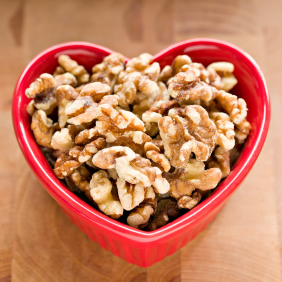5 Heart-Healthy Nutrients For Athletes

Heart disease is the leading cause of death in the United States, and lifestyle changes can play a significant role in preventing this common disease. Your heart is the most important muscle in your body, so this Heart Health Month, focus on factoring these nutrients into your diet to maintain a healthy, efficient heart.
1. Omega-3 Fatty Acids
For decades, diet gurus preached that a low-fat diet is the best way to maintain weight and keep your heart healthy. While an excess of fat can contribute to blocked arteries, we've learned in recent years that not all fats are created equal.
There are "good" fats and "bad" fats. Typically, plant-based fats such as avocados, olive oil, flaxseed, walnuts, chia seeds (yes, like your Chia Pet) are favored over animal fats, with the exception of salmon, which is an Omega-3 powerhouse.
These "healthy" fats such as Omega-3 fatty acids lower your risk of coronary heart disease by reducing your low-density lipoprotein (LDL) cholesterol levels, which is the "bad" cholesterol. You may have heard Omega-3 fatty acids called "essential" fatty acids. This means they are necessary for human health but the body cannot make them—you have to get them through food. It is best to consume your Omega-3 fatty acids from a natural source, but fish oil supplements are another option.
2. Fiber-Rich Whole Grains
After the low-fat fad faded, the low-carb frenzy was the next "secret" to weight loss. However, some high-fat, low-carbohydrate diets lack the heart-healthy fiber found in whole grains. Unrefined, fiber-rich whole grains such as steel cut oatmeal, bran, quinoa, and other whole grain products are essential for heart health and peak athletic performance.
Your body digests whole grains much more slowly than simple carbs, such as sugar and white bread. Therefore, whole grains keep blood sugar and insulin levels steady, provide sustained energy, and keep you feeling full. Finally, the fiber found in whole grains help lower LDL (low-density lipoprotein) cholesterol. Be sure to incorporate whole grains as an integral part of your diet for sustained energy and a healthy heart.
3. Soy Protein
In recent years, you have probably noticed a rise in popularity of soy-based products such as soy milk and tofu. Recent studies have linked soy protein with a reduced risk of heart disease. It has been found that the consumption of soy protein has led to a reduction in LDL cholesterol (the "bad" cholesterol), an increase in HDL cholesterol (the "good" cholesterol), and a reduction in triglycerides, a type of fat.
Soy products contain phytosterols and phytostanols, which are the molecules found in plant foods that hold this cholesterol-lowering property. However, be careful you don't fall into the marketing hype around soy products. Your soy sources may be genetically modified, so make sure you are consuming soy from natural sources such as soybeans, okra, tempeh, or edamame.
4. Folate and B vitamins
A 2001 clinical study found that folate, a water-soluble B vitamin, along with vitamins B6 and B12, play a role in promoting cardiovascular health. Plus, B vitamins have been linked to increased energy.
Folate, originating from "folium," the Latin word for leaf, can be found in leafy greens such as spinach, lentils and other legumes. The good news is that only small amounts of B vitamins are needed to reach the recommended dietary intakes, and B vitamins can be found in many foods including meats, vegetables, dairy products, and beans.
However, most people do not eat the recommended five daily servings of fruits and vegetables in order to gain the recommended amounts of B vitamins. Stock up on fresh, green leafy vegetables in order to enjoy increased energy to obtain your fitness goals.
5. Antioxidants
We often hear about the power of antioxidants, but many people don't know their function. Antioxidants are vitamins, minerals, and other nutrients that protect and repair cells from damage caused by free radicals.
To get your share of antioxidants, eat at least 4 to 5 cups per day of deeply colored fruits and vegetables. Three major antioxidant vitamins are beta-carotene, vitamin C, and vitamin E. Here are some sources:
a. Beta-carotene is found in orange-colored produce such as apricots, cantaloupe, carrots, mangoes, sweet potatoes, and orange citrus fruits.
b. Most people associate Vitamin C with orange juice, but it is best to obtain vitamins from whole foods rather than juices, since the fiber of the fruit is lost in juice form. If whole foods aren't available, choose 100 percent juices not from concentrate, canned fruits without added sugars, or frozen vegetables without added sodium or fat.
c. Finally, our favorite source of antioxidants is red wine and dark chocolate. These are excellent sources of flavonoids, which are antioxidants that have been linked to heart health.
A diet rich in these five nutrients will maintain a healthy and efficient heart. Make sure whole grains are your main form of carbohydrates, eat a diet rich in colorful fruits and vegetables, incorporate Omega-3 fatty acids, and finally, make a habit of integrating consistent aerobic exercise into your day.
Eat right and perform better. Find a nutrition plan for you.
Story Credit: http://www.active.com/nutrition/articles/5-heart-healthy-nutrients-for-athletes-875952


